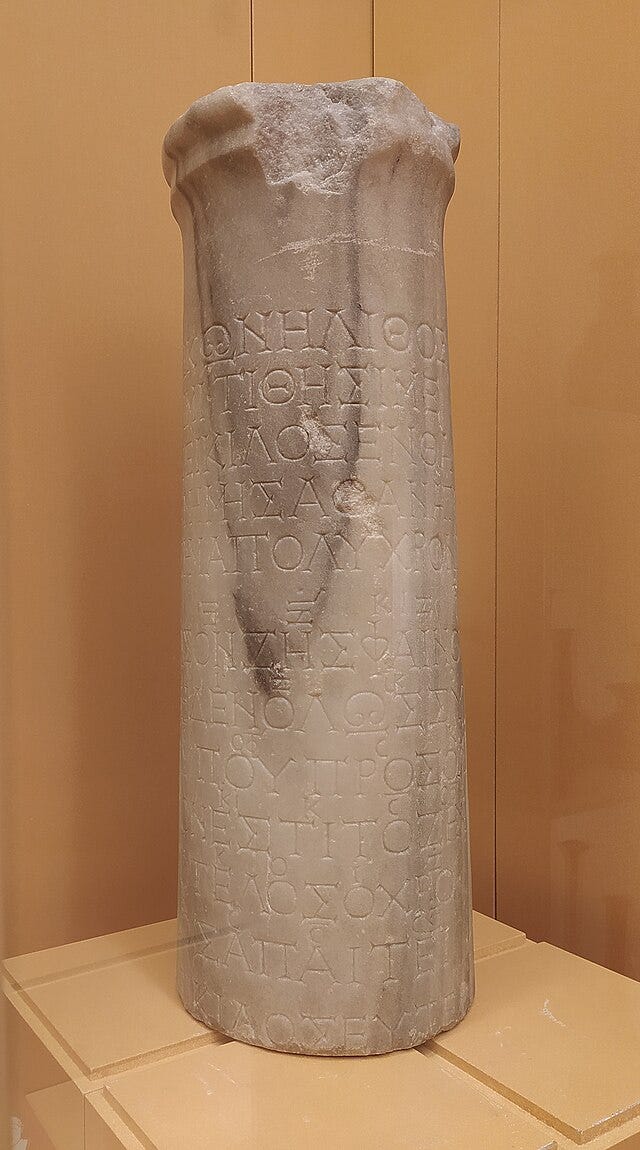As Long As You Live, Shine
Love in Ancient Greece, the importance of Valentine's Day, and history's most romantic lyric-poem

Love is in the air right now. Valentine’s Day is upon us and there is no shortage of jewelry commercials, candy specials, and pink everywhere. Though this Hallmark holiday has never been my favorite, I’ve recently embraced the philosophy behind it a bit more. It simply took me connecting the dots between the ancient and modern, and learning how to celebrate Cupid’s arrow my own way.
Love can be complicated. So much of our time is spent immersed in the theory of it. Movies, music, art, and books will forever tackle the perennial subject. Romcoms remain blockbuster hits and romance novels continue to outsell nonfiction.
Society is obsessed with love. It is one of the most important parts of life. Both giving and receiving it makes us happier, braver, stronger, and more fulfilled.
But this is no new phenomenon. As it turns out, Ancient Greece was pretty obsessed with love too.
Different Types of Love in Ancient Greece
While modern societies generally put all different types of affection under the vast umbrella of “love,” the Ancient Greeks didn’t take such a generalized approach. Like today, love was very important to them, so they recognized the importance of differentiating between different types of love.
In Ancient Greece, the culture celebrated and cultivated several different types of love. So I don’t end up writing a novel’s worth of words for this article, I’m going to focus on four that are still often referenced today when talking philosophy and ancient Greek history: Philia, Eros, Agape, Storge.
Philia was a very important and very common type of love because it represented the camaraderie, acceptance, and peace we feel with true friendship. The Ancient Greeks were huge on friendships. Their culture was one of the first to recognize the importance of man as a social being. He needed trustworthy friends, good conversation, and a flourishing culture he could venture out into with civility. This all falls under their “philia” type of love.
Eros represents romantic love, the type of love that is especially celebrated on Valentine’s Day. This type of love draws on intimacy, connection, and safety. Eros puts an emphasis on love directed at an individual, at the one you are in love with, rather than a generalized form of virility.
Eros was Ancient Greece’s god of love and desire, and when the Romans carried on many of the Hellenes’ traditions, they adopted their own god of love and desire modeled after Eros. His name was Cupid (sound familiar? More on him later).
Agape is the most spiritual type of love. It is found in the closest relationships one has with people, from parents and children to longtime couples. Agape deals with loving someone in a sacred way. It means accepting them for who they are, for their imperfections and perfections (I have said before, if one doesn’t believe in perfection, one has never been in love).
It means embodying that of a spiritually rich environment so that the person can be empowered to grow, prosper, and achieve happiness. Agape also centers around integrity, about having the courage and honor to stay loyal through the good times and bad. This type of love is a very noble virtue to spend your life pursuing. And it is beautiful that much of society does.
Storge is a lesser known type of love from Ancient Greece, but still important. Storge represents a more universal type of love. It’s goodwill to those around you. It’s civility while navigating the complexities of different relationships. It’s love for your child who is also an autonomous individual in their own right, or love for your husband who is also perhaps a brother and father. Storge is centered around empathy, understanding, and compassion.
We all have many roles we play in life, and Storge revolves around giving those close to you breathing room as they navigate all of those different roles that culminate into the total of the person they are. See why this is the least popular type of Ancient Greek love? It is quite complicated, and can be hard to stick to.
Understanding different types of love can have so many benefits for one’s life, and for the ones around him.
While philia focuses on friendships and agape focuses on spirituality, why not incorporate all of these types of love into one’s marriage? As lovers celebrate each other on Valentine’s Day, it is important to celebrate the one you love because he or she not only ignites the Eros within you, but also because he or she is your best friend, your spiritual peace, the center of your community, and so many more beautiful things to so many people.
Love is the Antidote to Life’s Chaos
No other symbol represents Valentine’s Day better than the image of Cupid with his bow and arrow ready to play matchmaker. We think of him as a modern, commercialized figure, but he’s really been around since the days of Ancient Greek myth. He was the son of Aphrodite, and by her command and his good aim, he caused Helen of Troy to fall in love with a beautiful young man, Paris. Their affair became the initial sparks that ignited the Trojan War.
If you love reading stories about mythology,
has released a great piece about the artwork, “The Judgement of Paris,” which deals directly with Cupid’s story. It’s a great family read for all ages.Cupid and his shenanigans playfully capture the joyful essence of Valentine’s day. He’s been around since some of the earliest recorded years of human existence. So why did it take me so long to appreciate his work?
While not a traditional romantic, the older I get the more poignantly aware I become of the importance of love, of all types of love covered earlier in the article.
Maybe it’s a Galentine’s Day celebration honoring the importance of female friendship. Or a quiet date night at home with my groom. Or even simply scrolling through Substack Notes and witnessing all of the passion and love creators are putting behind their newsletters. As endless battles rage throughout our culture and the world, it has become obvious to me, love is the antidote to life’s chaos.
Two literary quotes come to mind when I think of encapsulating the gravity of the importance of love in as little words as possible.
One is from Beowulf, which I’ve been re-reading thanks to a wonderful reading challenge headed up by Professor John Halbrooks. It’s a passing line in the story, but the alliteration stuck with me. It’s in reference to a royal warrior’s wife. The line says she’s, “a balm in bed for the battle-scarred Swede.”
I can think of no better way to describe both what a wife ideally wants to be and should be, a healing, calming force for her mate.
The other comes from a poem by W.H. Auden titled “September 1, 1939.” The last line of the poem, which he wrote as Nazi Germany invaded Poland, is, “We must love one another or die.”
For so long, to me, Valentine’s Day was candy hearts, card exchanges, and an excuse to eat way too much chocolate. But just like all other holidays, as I age and turn over the hidden meanings behind the essence of each occasion, vital, life-affirming principles and lessons become very clear.
Valentine’s Day is about love, that balm for the battle-scarred. I think it’s safe to say, no matter who you are, you’ve got a few scars worth healing, and celebrating.
An Ancient Monument to Love
One of the most romantic gestures in the name of love happened in Ancient Greece. The civilization gave history so many firsts. And one of those firsts is the very first written musical composition in complete form.
This wonder is famously known as the “Seikilos Epitaph.” I’ve had the honor of writing about it at length for Epoch Bright, which you can read here.
A weighty column most scholars agree was a monument meant for his late wife, Euterpe, Seikilos inscribed the musical notation to the song he wrote for her on the column.
He dedicated it to her, stating on the monument, “Seikilos placed me here as a long-lasting sign of deathless remembrance.” He also included this beautiful poem on the stone as well:
“As long as you live, shine,
Let nothing grieve you beyond measure.
For your life is short, and time will claim its toll.”
The piece of music is short, but Seikilos was clearly a genius because the emotion he packed into the few phrasings leaves you immovable and speechless. The notes are full of yearning, wonder, and praise.
Of course one of the oldest music compositions in recorded history is a love song.
I’ve recorded a simple version of the melody below on my guitar for you to take a listen to. It’s similar to what is inscribed on the stone monument. You can also find a more in depth interpretation of the song here (one of my favorites), which features vocal parts after the introduction of the core melody.
Because the music was translated from an ancient language, no true replication exists. Each recording of “Seikilos Epitaph” is an interpretation based off of the fundamental melody:
(The melody is fingerpicked, so you may need to turn your volume up a bit)
Amid the jewelry commercials, sugar overload, and bustling restaurants this Valentine’s Day, let’s take a moment to remember the all-important virtue behind the celebration, love, and what that word really means.
It’s an antidote, a balm. And if we are even half as good and romantic as Seikilos and Euterpe, our love can stand on its own. It can stand as an example, a shining monument embodying deathless remembrance.
And as long as you live, remember, shine.




